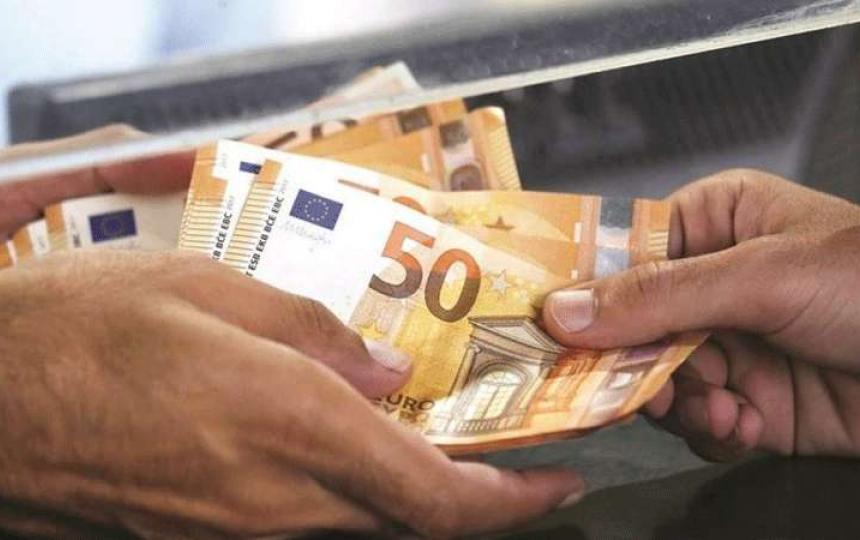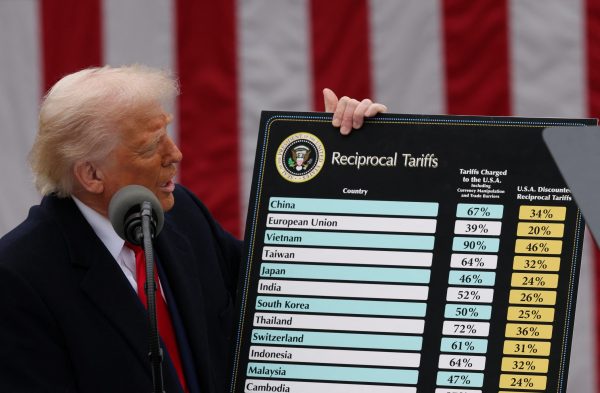
Some positive news and an alarm were “hidden” in the report of the Commission, which, yesterday, announced its winter forecasts for the course of the European economy.
First, it revised upwards the estimates for the Greek GDP for the last year at 8.5% and thus gave significant “breathing space” in relation to the previous forecasts. The estimates were also higher than those of the Ministry of Finance. Growth in 2021 is estimated to be higher at 8.5% – instead of 7.1% in the autumn report – and for 2022 the forecast is slightly lower at 4.9% – instead of 5.2%.
But on the inflation front, the European Commission estimated in the autumn that in 2022 it will reach only 1%, while now it “sees” that it will be more than three times higher at 3.1%. This percentage is an omen that households and businesses will be pressured by price increases and the financial staff will be called upon to cover part of the costs.
How many billions does this breathing space translate to
These new forecasts make March even more crucial. Then the final figures for GDP in 2021 will be announced. If these estimates are confirmed close to 8.5%, this means that the Greek economy ran faster than the ministry’s estimates, which were close to 7%. This translates into an additional space given by the strongest growth of last year, as the state budget of 2022 was based on the growth forecast for 2021 for 6.9% and a nominal GDP of about 178 billion. So it gives a nominal GDP that is more than 2 billion higher than forecast.
But for 2022 things are different – and especially on the inflation front the landscape is predicted to be more difficult. The Ministry of Finance from 1% increase now sees an increase to 1.5-2% and the Commission 3.1%.
The good news is that the recovery remains strong and close to 5% this year, but the challenges that lie ahead in the coming months are manifold.
That is, the factors that supported GDP in 2021 are the same factors that will lead to GDP growth in 2022. These are consumption and tourism. This year, to these are added investments, which will be supplied mainly by the Recovery Fund. Therefore, whether the targets for the investments of 11 billion euros, which are foreseen in the budget, will be achieved is a wager, and secondly, whether the “pandemic” factor will actually decline as estimated (in order for tourism to recover to pre-Covid levels this year) and thirdly, for inflation not to hurt consumption.
How frightening is the increase in Greek bond yields
On top of this climate, there is the turmoil in European bond markets, due to inflation, which mainly increases the cost of borrowing in a possible exit of Greece to bond markets (the yield on the Greek ten-year bond has increased to 2.5% from about 0.8% in September). The levels so far are considered within the forecasts, given the circumstances and in view of the interest rate hikes by the ECB in autumn. It is noted that Greece has planned to borrow in total, in 2022, from the markets (supported by the coverage offered by the European Central Bank through the bond purchase program) around 12 billion euros. With the previous issue in January, it raised 3 billion euros.
Read also: Greek Exporters Association (SEVE): Record of € 40 billion in exports – Top 9 sectors
However, the current increase in yields has led the leadership of the Ministry of Finance to be very careful in fiscal policy and at the same time freezes plans for a new exit to markets. The cash cushion is nevertheless at satisfactory levels close to 37-38 billion euros which will be reduced in the near future, as it is foreseen within the next months to repay loans to the IMF and transnationally from the 1st Memorandum about 7 billion Euros.
When will inflation and new measures be reduced?
The Commission gives a ray of “light” on the duration of inflationary pressures so we can see whether the glass is… half-full. The Commission does point out that electricity and fuel prices are expected to rise to the highest level during the first quarter but will relax later in the year. It notes that the high energy costs are expected to be transferred to the retail market, making the household basket more expensive.
The government’s message is that it will support households and businesses during the wave of price gouging and whatever interventions it takes will focus on low and middle incomes. All of this, according to officials, is centered on the budgetary strength of the economy. Hence the government’s message to the troubled – at European level – bond markets and the Institutions is that the country continues on the path of a return to fiscal normalcy.
In this context, it is focusing on measures that do not have a significant budgetary impact, such as subsidies for electricity and gas, as these resources come from the Transition Fund. The reductions in food taxes, which can cost around 500-700 million euros depending on the duration, are off the table at the moment. It is estimated that a possible zeroing of the repayable advance costs 3 billion Euros, while a new haircut on the repayable part costs 1 billion. A hypothetical extraordinary reduction of VAT on some foods can cost close to 500-700 million. The least likely measure is the reduction of the indirect tax on fuel since they generate about 6 billion euros per year.
Both for society and fiscal normality
In any case, according to the financial staff, any additional resources that may be created will return to society. At the moment, the cards in the deck of whatever interventions remains closed in order for the government to first have a clear picture of the course of the economy and revenues. It is noted that the Greek government has set as its main goal the upgrade of the Greek debt to the investment level by the beginning of 2023 and this presupposes the improvement of the fiscal image. The budget aims to reduce the primary deficit to around 1.5% this year from around 6.5% last year.
It should be noted that the provisional data that will be announced next week, for the January revenues, are expected to show, according to the information, the lag of the revenues against the targets, mainly due to the effects of the “Omicron” mutation and the severe weather front “Elpida” , which affected economic activity. The focus is now on February, where a better picture is expected, as the first installment of the 36-72 installment arrangement for pandemic debts and the income tax for retroactive payments in 2020 are expected to be collected.
Read also: Budget: Low revenue in January
The aforementioned upward trend of prices and the international situation with the increases of the yields on the government bonds are taken into account in presenting the whole picture. This is because as central banks launch interest rate hikes, so investors are once again turning their attention to government debt ratios. This requires special attention for the countries of southern Europe, as yields in Italy, Greece and Spain are growing faster than those in the north.
Commenting on the Commission’s forecasts, the Minister of Finance Christos Staikouras stated, among other things, that they confirm the excellent course of the Greek economy and its auspicious prospects and that the country achieves a stronger “type V” recovery in 2021 – the second largest in the eurozone – covering almost the whole of 2020 losses. This recovery is followed by high and sustainable growth, for both 2022 and 2023, the second highest – cumulatively – in three years. In addition, he stressed that Greece showed the lowest average inflation rate in the eurozone in 2021. Inflation is significantly picking up in 2022, but remains below the European average until 2023. He stressed that the government will continue to implement a prudent fiscal policy, the implementation an insightful publishing strategy and the promotion of reforms.
Latest News

Trump Tariffs Jeopardize Growth: Piraeus Chamber of Commerce
The tariffs, aimed at reducing the U.S. trade deficit, are expected to have both direct and indirect effects on the European economy

EU Condemns Trump Tariffs, Prepares to Retaliate
As tensions escalate, the EU is expected to continue negotiations with Washington while preparing for potential economic retaliation.

The Likely Impact of Trump Tariffs on Europe and Greece
Trump tariffs are expected to negatively affect economic growth in the Eurozone while Greece's exports could take a hit.

Motor Oil Results for 2024: Adjusted EBITDA of 995 mln€; Proposed Dividend of 1.4€ Per Share
Adjusted EBITDA for 2024 was down 33% yoy. The adjusted profit after tax for 2024 stood at 504 million euros, a 43% decrease from the previous year

Cost of Living: Why Greece’s 3% Inflation Is Raising Alarm
Greece appears to be in a more difficult position when it comes to price hikes, just as we enter the era of Trump’s tariffs.

Fitch Ratings Upgrades the Four Greek Systemic Banks
NBG’s upgrade reflects the bank’s ongoing improvements in its credit profile, Fitch notes in its report, including strong profitability, a reduction in non-performing exposures (NPEs), and lower credit losses

Trump to Announce Sweeping New Tariffs Wednesday, Global Retaliation Expected
With Trump's announcement just hours away, markets, businesses, and foreign governments are bracing for the fallout of one of the most aggressive shifts in U.S. trade policy in decades.

Inflation in Greece at 3.1% in March, Eurostat Reports
Average inflation in the eurozone settled at 2.2%, compared to 2.3% in February

Greece’s Unemployment Rate Drops to 8.6% in February
Despite the overall decline, unemployment remains higher among women and young people.

Jerry Kalogiratos Highlights Key Role of Energy Transition and Data Demand in LNG Outlook
Energy transition and the prospects of LNG were discussed at Capital Link’s 19th Annual International Maritime Forum, during a panel discussion with Jerry Kalogiratos (Capital Clean Energy Carriers Corp.)
























![ΕΛΣΤΑΤ: Αυξήθηκε η οικοδομική δραστηριότητα κατά 15,6% το Δεκέμβριο [πίνακες]](https://www.ot.gr/wp-content/uploads/2025/03/DSC9655-2-1024x569-1-90x90.jpg)

















 Αριθμός Πιστοποίησης
Αριθμός Πιστοποίησης